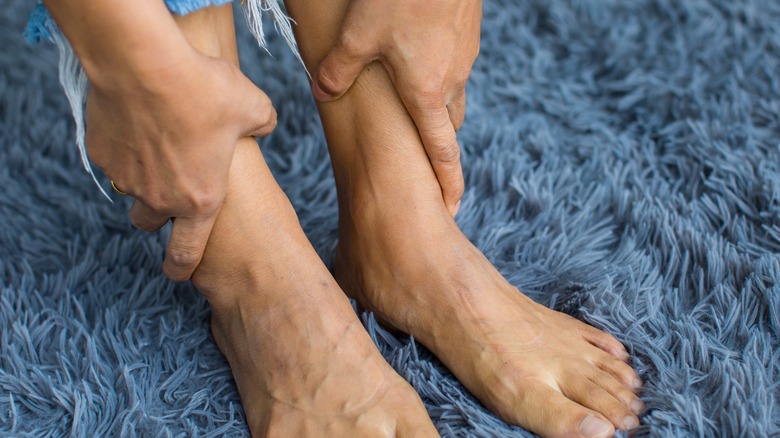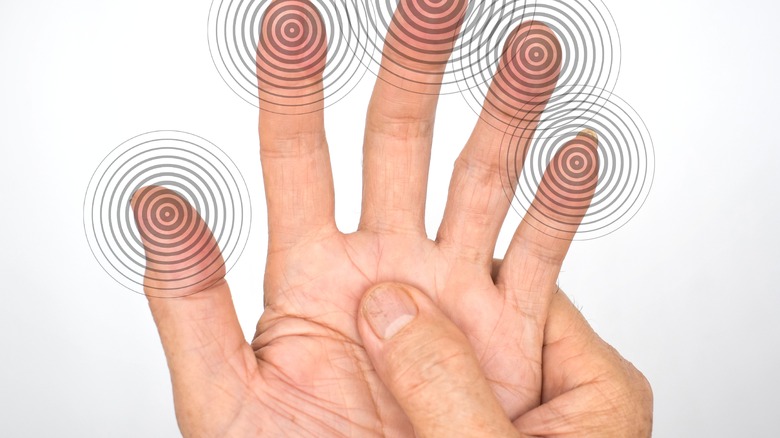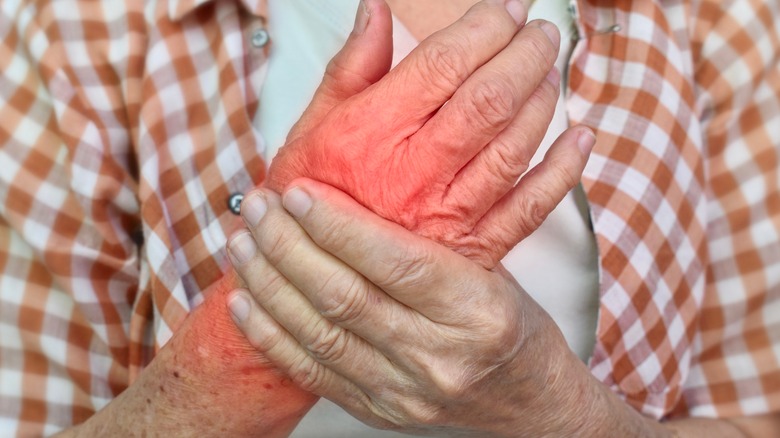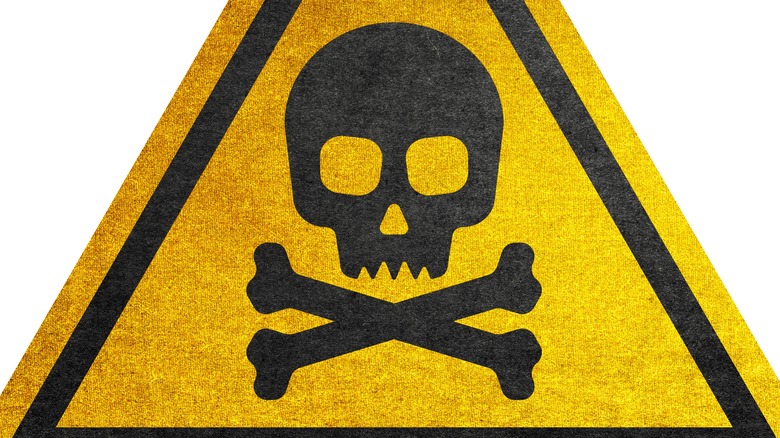Numbness And Tingling In The Body Explained
Getting any unusual feeling in the body is enough to throw many people into panic mode. One certainly odd feeling is a part of the body going numb and tingling. You may be curious about why this happens, what causes it, or if you should be concerned about it. In most cases, numbness and tingling should not be a cause for worry, as they're merely a passing sensation. Additionally, experiencing numbness and tingling isn't that uncommon, as almost everyone experiences them. Still, this fact, though comforting, doesn't make the sensation less annoying.
The actual term used by medical professionals to describe numbness and tingling is paresthesia (via Healthline). Paresthesia can appear in other forms: the pins and needles feeling, skin prickling, electric shock-like sensations, or skin crawling (via Australian Family Physician). There are many causes of numbness and tingling. Most times, it's something harmless, but sometimes, it's caused by a medical condition. Read on to find out the possible explanations behind tingling and numbness in the body.
What's it like to experience numbness and tingling
Numbness and tingling usually happen at the feet, legs, arms, or hands. While these feelings can be unexpected, they usually go away quickly (via Health Grades). A typical case of numbness and tingling is when you lose feeling in your arm or leg and it seems like that part has fallen asleep. Then, as it wakes up, you begin to get a rush of tingling sensation.
Numbness and tingling indicate that your nerves are not functioning as they should. Your nerves are responsible for relaying signals from your brain, your spinal cord, and every part of your body (via Brigham and Women's Hospital). If nerves in a particular part of your body get irritated, or if their activity gets disrupted, you get that numb, tingling feeling or another form of paresthesia. This is usually temporary, and the nerves go back to their normal activity.
Sometimes, in addition to numbness and tingling, you might notice other abnormal sensations: one limb feeling different from the other, the affected area feeling different to touch, muscle weakness, or pain. This suggests that there might be a more serious condition behind numbness and tingling and you need medical evaluation to find the cause (via Health Grades).
Innocent habits that cause numbness and tingling
Most times, that weird numb and tingly sensation comes when you subject a part of your body to constant, intense pressure (via Brigham and Women's Hospital). This causes an obstruction to the passing of nerve signals, leading to you losing feeling in that region or experiencing an unusual sensation. When you relieve the pressure, you get a tingling or "pins and needles" feeling because your nerves fire excess signals as they return to normal activity. Also, pressure in any area causes poor circulation. This, too, disrupts nerve function, as your nerves need oxygen and glucose from blood to work well.
How could you be putting extra pressure on a nerve? Well, maneuvering your body into an awkward position or putting weight on a body part will do the trick. For example, sitting with your legs crossed can squeeze your peroneal nerve and cause a tingly sensation in your foot or lower leg (via Elevate 360). Sitting in one position for too long (perhaps on the toilet) or sitting with your feet tucked under your bum will also cause your feet to tingle. If you've ever woken up with numb hands, it's probably because you've compressed your median or ulnar nerve by sleeping with your elbows bent. Another likely cause is sleeping with your head on your forearm, as this puts pressure on the radial nerve (via Healthline).
Numbness and tingling could be a warning sign of nerve injury or damage
Your nerves are made up of bundles of fibers known as axons (via Buoy Health). Nerve fibers have protective tissues, and many fibers are covered by myelin as well. The myelin sheath insulates the axon and causes rapid passage of signals. Nerve damage or injury can happen to the fiber, protective tissues, or myelin sheath. This could come from an external injury or any condition that irritates, tears, or puts pressure on a nerve. And when a nerve gets damaged, the symptoms you feel depend on the function of the affected nerve fibers and the extent of injury. For example, the mildest form of damage (known as neuropraxia) affects the myelin sheath. More severe forms of damage range from damage to protective tissues to complete severing of the nerve.
Nerves outside the brain and spinal cord (known as peripheral nerves) control movement, internal bodily functions, and sensory perception. Peripheral nerves are prone to injury because they are fragile. The medical term for damage to these nerves is peripheral neuropathy (via Mayo Clinic). You may experience numbness and tingling when sensory nerves get damaged. These nerves are responsible for carrying your sensations — touch, heat or cold, pain. Along with numbness and tingling, you might have problems recognizing these sensations when a sensory nerve is damaged.
Some medical conditions cause numbness and tingling
Numbness, tingling, or other forms of paresthesia are features of many medical conditions. For example, type 2 diabetes causes paresthesia in many patients (via an article published in InTech Open). This is because of progressive damage to nerves due to diabetic neuropathy. Also, paresthesia is a common symptom of multiple sclerosis. Numbness and tingling is common following nerve compression syndromes in which a condition puts pressure on a peripheral nerve (via Cleveland Clinic). This is associated with many conditions, including carpal tunnel syndrome, tarsal tunnel syndrome, isolated femoral neuropathy, disk herniation, arthritis, tumors, spinal stenosis, and sciatica.
Numbness and tingling can also result from conditions that prevent proper circulation to certain parts of the body like stroke, thoracic outlet syndrome, and Reynaud's syndrome. Conditions that affect levels of some hormones (e.g., hypothyroidism, hyperaldosteronism, hypoparathyroidism, menopause) may lead to paresthesia because of the importance of such hormones to the nervous system. Numbness and tingling can also follow skin damage from burns or frostbite (per InTech Open).
Numbness and tingling can be caused by these infections
Infections are able to cause numbness and tingling when they affect your nerves, particularly sensory nerves. They cause other symptoms if other peripheral nerves or nerves within your brain and spinal cord (central nerves) are affected. Without treatment, some bacteria or viruses responsible for infections cause inflammation of the nerves, leading to nerve damage. Also, as the immune system tries to fight off certain infections, nerve fibers can get damaged.
The bacteria that causes Lyme disease, known as Borrelia burgdorferi, can damage peripheral nerves especially in the face and limbs when the disease progresses (via iMed Regeneration Center). Mycoplasma pneumoniae, another bacteria, causes pneumonia and can escape the lungs and damage peripheral nerves. The Varicella-zoster virus, which causes chickenpox, can lay dormant within nerves for years. And if triggered, the virus causes shingles, which comes with nerve damage. The hepatitis C virus and the virus that causes Covid19 are also able to cause nerve damage. Similarly, human immunodeficiency virus (HIV) can directly cause nerve damage. Lastly, damage can also be caused by other infections that take hold because of the weakened immune system of people with this virus.
Numbness and tingling could be a sign of nutrient deficiency
The nutrients you get from food have an impact on different body systems, including your nervous system. It's why certain nutrient deficiencies affect the health of your nerves, causing various unpleasant symptoms. B vitamins are important to nerve health, particularly vitamin B12 (via Southwest Florida Neurosurgical and Rehab Associates). A deficiency of this vitamin causes your nerves to lose their myelin sheath. Vitamin E deficiency also affects nerve function. Low amounts of some minerals like calcium, potassium and sodium can also cause nerve dysfunction.
Both a deficiency in and excess amounts of vitamin B6 can cause nerve damage. While vitamin B6 deficiency is not common (as the nutrient is found in many foods), it can still be caused by some medications or genetic abnormalities. Taking vitamin B6 in excess amounts can cause damage to peripheral nerves, especially sensory nerves, per this review published in Advances in Nutrition. This is relevant to know because you can get excess vitamin B6 from supplements, fortified foods, or some medications. The daily requirement of this vitamin is 1.5 to 1.8 milligrams. The dose at which vitamin B6 causes altered nervous functions is not certain, as people respond differently to excess B6. However, the earliest symptoms of nerve damage from excess B6 is numbness and tingling.
Why some drugs cause numbness and tingling
Certain prescribed drugs cause peripheral neuropathy as side effects, per this review in Current Clinical Pharmacology. Some drugs release chemical substances known as neurotoxins into the body. Weeks to months of taking these drugs can lead to buildup of neurotoxins and eventual nerve damage, which is sometimes irreversible. The kind of damage, its extent, and symptoms depend on the particular drug and dosage given. To a larger extent, sensory nerves get much of the damage. This causes paresthesia (mostly in the hands and feet) and a reduced ability to detect sensations.
It is estimated that medications cause about 4% of all cases of peripheral neuropathy. This is more likely, though, among people at a higher risk of peripheral neuropathy (e.g., those with diabetes, genetic predisposition, or pre-existing nerve damage). Most cases of nerve damage from drugs result only in mild paresthesia; reducing the dose of the drug or stopping the treatment gets rid of the discomfort. More severe damage or symptoms may warrant medical treatment.
Peripheral neuropathy is common (with a 60% likelihood) following cancer chemotherapy with medications like platinum, vinca alkaloids, arsenic trioxides, epothilones, taxanes, bortezomib, and thalidomide. Drugs used to treat cardiovascular diseases, like statins and amiodarone, cause nerve damage with prolonged use in some patients. Prolonged use of the antibiotics isoniazid and ethambutol causes nerve damage. These antibiotics are used to treat tuberculosis. Lastly, prolonged use of the antibiotic metronidazole (flagyl) causes nerve damage as well, albeit in rare cases.
Numbness and tingling from alcohol use
Persistent heavy drinking can potentially cause harm to many body systems, including the nervous system. It can lead to gradual damage of peripheral nerves, which can cause symptoms like numbness, tingling, burning, and pain, especially in your limbs. This kind of nerve damage is known medically as alcoholic neuropathy, and is estimated to affect from 25% to 66% of long-term drinkers (via American Addiction Centers). Compared to men, women have a higher risk of alcoholic neuropathy and more severe symptoms which get worse faster. Fortunately, nerve damage can be reversed in many cases.
There are several ways prolonged heavy drinking can cause nerve damage. Alcohol can directly damage the myelin sheath. Chronic alcohol use is also known to cause deficiencies of vitamins B12, B9, and B1. Alcohol use can affect how the body stores and uses these vitamins. Additionally, heavy drinking is associated with eating less nutritious meals.
The amount or length of alcohol use that results in alcoholic neuropathy is not certain, as this is different for each individual. But it usually takes years of heavy drinking to develop alcoholic neuropathy. If you need a benchmark, taking over three drinks in a day or 7 drinks within a week is considered heavy drinking for women; for men, heavy drinking is any amount above four drinks in a day or 14 drinks weekly (per the National Institute on Alcohol Abuse and Alcoholism). Taking fewer or no drinks is always better, though.
Numbness and tingling can be caused by exposure to toxins
Certain toxins are capable of causing nerve damage (peripheral neuropathy) if you are exposed to them for a long time. The highest exposure to toxic chemicals comes from treatments like chemotherapy or other drugs, per this review published in Toxicologic Pathology. People may also get exposed to arsenic, lead, mercury, and organophosphorus compounds, but this usually happens in hazardous work environments or due to environmental contamination.
There are certain products where these toxins may be found. For example, some herbal medicines are contaminated with heavy chemicals like mercury and arsenic. Thus, taking these products for long periods can cause nerve damage or other health problems (via the Foundation for Peripheral Neuropathy). By sniffing glue, you inhale toxic materials like hexa-carbons which can cause nerve damage. Another route of exposure to toxins is through certain insecticides, herbicides, and solvents. Some toxins are also found in improperly prepared shellfish (brevetoxin, ciguatera, saxitoxin) and puffer fish (tetrodotoxin).
Depending on the type of toxin, damage can happen to the nerve fiber (axon), nerve cell, or Myelin sheath, notes the review. The affected area and severity of damage will determine the symptoms experienced. However, most people experience weakness, numbness, tingling, or another type of paresthesia in the hands and feet. These symptoms are usually reversed when exposure to a toxin is stopped, but it may take some time.
Why anxiety causes numbness and tingling
Anxiety disorders are associated with many symptoms. People with anxiety can experience numbness, tingling, or other forms of paresthesia like itching, skin crawling, prickling, or a pins and needles sensation (via Anxiety Centre). These sensations can happen anywhere in the body. They can occur on their own or happen before, with, or after other symptoms of anxiety. They may happen when you're nervous, afraid, stressed, or for no real reason. How often these sensations come, how intense they are, and the affected areas differs among people with anxiety.
One possible cause of numbness and tingling from anxiety is the flight or fight response, a response to stress or a perceived threat (via Healthline). It's possible that the body under anxiety abnormally activates this response, which consequently triggers many actions in the body. One of these actions is shunting blood from your extremities to organs that you need to run or fight (like your muscles). The reduced blood supply at your extremities can cause paresthesia. Paresthesia can also be an effect of hyperventilation, which is common to people with anxiety. Hyperventilation reduces the level of carbon dioxide in the body, causing blood vessels supplying your extremities to constrict and reducing blood supply to these regions. It's also worth noting that some anti-anxiety or antidepressant medications cause paresthesia as a side effect (per Anxiety Centre).
What to do if you experience numbness and tingling
In most cases, numbness and tingling or other forms of paresthesia will go away on their own (via Healthline). To help quicken the return to normalcy, there are some things you can do. The most logical method is to relieve pressure or free up your body if numbness and tingling are caused by excess pressure. Movement helps lessen this discomfort, as it encourages blood circulation. You can wiggle your fingers or toes, clench and unclench your fists, or walk around. If your arm is affected, try rocking your head from side to side to relieve nerve compression in the neck (where nerves supplying the arm pass). If you often get numbness and tingling, massages, yoga, trying to stay cool, and wearing shoes that are not tight can help reduce the occurrence.
While numbness and tingling may have harmless causes in many people, certain cases necessitate seeking medical help (i.e., if your symptoms happen frequently, are very intense, last a long time, get worse over time, happen in a specific part of your body, happen whenever you do certain things, or interfere with your usual activities). It's also important to contact your healthcare provider if your symptoms follow an injury, happen on both sides of your body, or happen with other symptoms such as a rash, dizziness, or muscle spasms (via WebMD).












